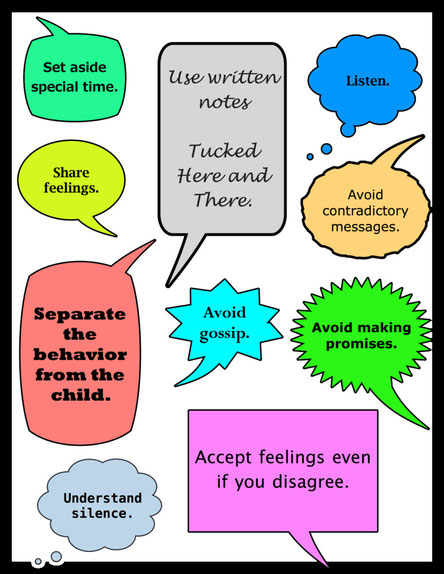
I've found that one of the best ways to communicate with children is to listen (actually this applies to adults too). Some gifted children can be sensitive to barriers to effective communication such as sarcasm, interruptions, and condescension. Gifted or not, child or adult, everyone can benefit from the following ten principals of good communication. They are paraphrased from the countless communication tips found in the book, A Parent's Guide to Gifted Children by James Webb, Janet Gore, Edward Amend, and Arlene DeVries.
1. Listen: Listening conveys that your child's feelings and ideas are valued. If you must give advice, first indicate that you understand how she feels.
2. Accept feelings even if you disagree: Feelings are never right or wrong. Accepting your child's feelings communicates that her opinions and attitudes are
important to you.
3. Understand silence: There are many reasons why a child may be silent: anger, to gain control, protection from a lack of understanding, a need for privacy
etc. If you know the motivation, that can help. Sometimes, it may be appropriate to let silences occur because that communicates acceptance and a need for privacy.
4. Set aside special time: Consistency and frequency are more important than length. Five minutes every day of your full, undivided attention sends the message
that she is a high priority.
5. Avoid gossip: Your child can be hurt if she overhears you talking about her problems or shortcomings.
6. Share feelings: Express your own emotions in healthy ways so she can view another's emotions too.
7. Separate the behavior from the child: Praise or reprimand the behavior rather than the child. "You are smart," is not as meaningful as, "I admire how you
completed your English essay on time." Instead of, "You never remember the rules," say, "That behavior is not allowed."
8. Avoid contradictory messages: Sometimes your words can indicate one feeling, but your voice tone and body language say something different. "Your report card
is better than last term," can be interpreted differently. Depending on your tone, the words might mean, "Great job!" or, "It's better, but you're still not doing enough."
9. Avoid making promises: It's important that you are honest about what you can and cannot promise. Help your child understand that your priorities are to keep her
safe, but you will try to respect her privacy.
10. Use written notes tucked here and there: There's nothing better than finding a note in unexpected places. It always communicates, "I love you."

